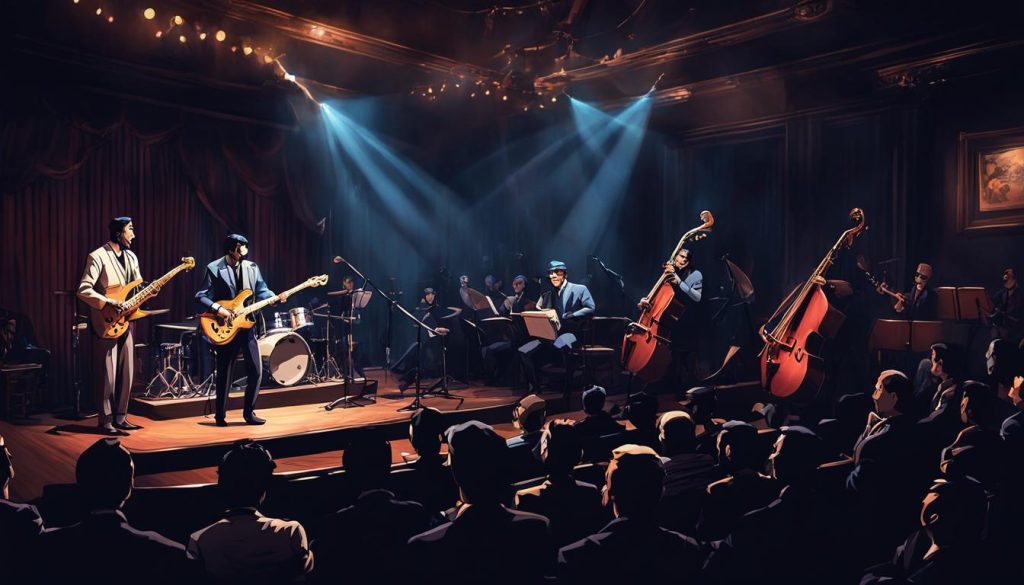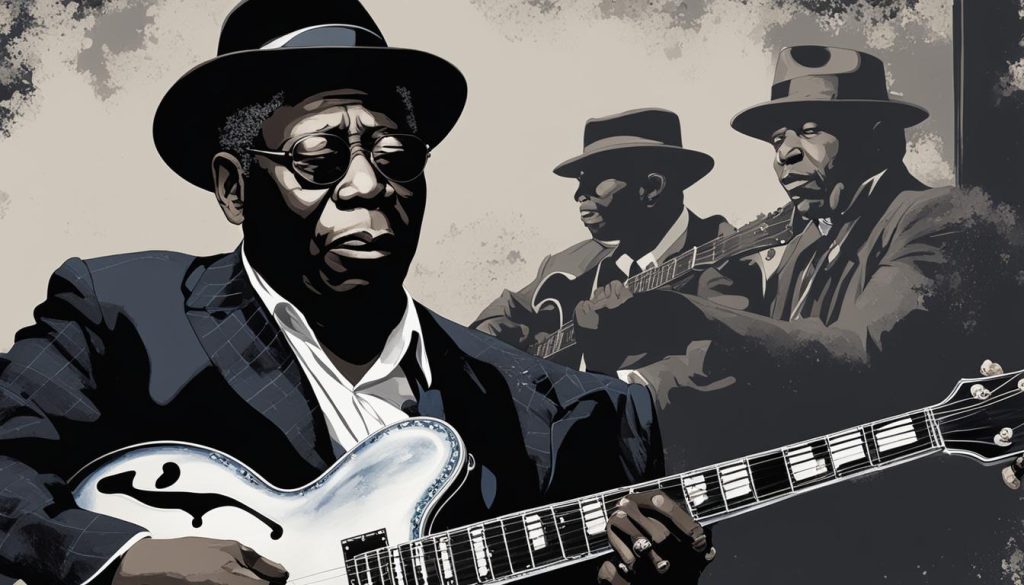Essential Guide to Blues Music History & Artists
Blues music has a rich and storied history, with origins that date back to the early 20th century. This genre has evolved over the years, influenced by jazz and rock music, and has been shaped by some of the most influential artists to ever grace the stage. In this comprehensive guide, we will explore the history of blues music, its evolution, and showcase some of the most iconic blues artists of all time.
Key Takeaways:
- Blues music has a deep and fascinating history, rooted in African-American communities.
- Regional styles of blues, such as Delta and Chicago blues, are an important part of the genre’s evolution.
- The fusion of blues with jazz and rock music helped to shape the modern blues sound.
- Influential blues artists like B.B. King, Muddy Waters, Robert Johnson, and Etta James have all left an indelible mark on the genre.
- Whether you’re a lifelong fan of blues music or simply curious about its history, this guide serves as an excellent resource for deepening your understanding of this culturally significant art form.
Blues Music History
The history of blues music can be traced back to African-American communities in the early 20th century. It evolved from African musical traditions, spirituals, and work songs, and eventually developed into a new form of music that expressed the struggles and emotions of African-American life.
One of the earliest regional styles of blues music was Delta blues, which originated in the Mississippi Delta. This style was often accompanied by a single guitar and harmonica and featured raw, emotional vocals. Another popular regional style was Chicago blues, which had a more urban sound and often featured full bands with horn sections.
The advent of electric blues in the 1940s and 1950s brought a new sound to the genre, with musicians using amplified guitars and other electronic instruments. This change pushed blues music into the mainstream and paved the way for future rock and roll artists to build upon its foundation.
“Blues is a tonic for whatever ails you. I could play the blues and then not be blue anymore.” – BB King
Evolution of Blues
Blues music has an evolving history that has been shaped by its influences from other music genres, such as jazz and rock. In the 1960s and 1970s, blues music fused with rock music, resulting in a subgenre of blues known as blues rock. This fusion gave rise to new sounds and styles, with artists like Jimi Hendrix and Eric Clapton leading the pack. Jazz influence also played a significant role in the evolution of blues music, with artists like Duke Ellington incorporating blues elements into their jazz compositions.
Contemporary blues also continues to evolve, with artists pushing the boundaries of the genre and introducing new sounds. Musicians like Gary Clark Jr. and Keb’ Mo’ have been at the forefront of this movement, experimenting with different instruments and musical elements to create a contemporary blues sound.

“Jazz and blues are the two sides of the same coin. They are intimately tied together, and you can’t separate them.” – B.B. King
Influential Blues Artists
Blues music has been shaped by many influential artists over the years. In this section, we will delve into the contributions of some of the most renowned blues musicians of all time, including B.B. King, Muddy Waters, Robert Johnson, and Etta James.

| Name | Birth Year | Origin | Major Works |
|---|---|---|---|
| B.B. King | 1925 | Mississippi | The Thrill is Gone, How Blue Can You Get |
| Muddy Waters | 1913 | Mississippi | Hoochie Coochie Man, Mannish Boy |
| Robert Johnson | 1911 | Mississippi | Come On In My Kitchen, Cross Road Blues |
| Etta James | 1938 | California | At Last, I’d Rather Go Blind |
B.B. King, also known as the “King of the Blues,” was known for his soulful guitar playing and smooth vocals. His hits such as “The Thrill is Gone” and “How Blue Can You Get” continue to inspire musicians around the world.
Muddy Waters was a pioneer of the Chicago blues sound with hits like “Hoochie Coochie Man” and “Mannish Boy.” He also helped to launch the careers of other iconic blues artists, including Little Walter and Willie Dixon.
Robert Johnson’s haunting voice and masterful guitar playing made him a legend of the blues. Despite his short life, his influence can still be heard in the music of countless musicians today.
Etta James’ powerful vocals and emotional delivery made her one of the greatest blues singers of all time. Her classic ballad, “At Last,” remains one of the most beloved songs of the genre.
These influential blues artists have left a lasting legacy on the genre, shaping its sound and inspiring generations of musicians to come.
Conclusion
Blues music has a rich history that has evolved over time, gaining influence from jazz and fusing with rock in the 1960s and 1970s. The genre’s enduring popularity owes much to its legendary artists such as B.B. King, Muddy Waters, Robert Johnson, and Etta James, who have helped shape its sound and ensured its resonance with audiences worldwide.
Today, contemporary blues music continues to captivate listeners and push the genre in exciting new directions, maintaining its relevance and cultural significance. Whether you’re a lifelong fan or just discovering blues music, this comprehensive guide should enhance your understanding and appreciation of this timeless art form.
FAQ
What is the history of blues music?
Blues music originated in African-American communities in the early 20th century. It evolved from spirituals, work songs, and field hollers, reflecting the struggles and experiences of Black Americans.
What are the different regional styles of blues?
Blues music has various regional styles, with some of the most notable ones being Delta blues and Chicago blues. Delta blues emerged in the Mississippi Delta region, characterized by its acoustic guitar-driven sound, while Chicago blues developed in the urban setting of Chicago, featuring amplified instruments and a more electric sound.
How did electric blues impact the genre?
The advent of electric blues in the mid-20th century marked a significant shift in the genre. With the introduction of electric guitars and amplification, blues artists were able to create a louder and more energetic sound, leading to the development of new subgenres like rhythm and blues (R&B) and rock and roll.
How has blues music evolved over time?
Blues music has undergone several transformations throughout its history. It has been influenced by other genres, such as jazz, leading to the fusion of blues and jazz styles. In the 1960s and 1970s, blues also merged with rock music, giving rise to blues-rock. Today, contemporary blues artists continue to draw on these influences while incorporating their own unique styles and sounds.
Who are some influential blues artists?
Blues music has been shaped by many influential artists. Some notable figures include B.B. King, known for his soulful guitar playing and emotive vocals, Muddy Waters, a pioneer of electric blues, Robert Johnson, a legendary Delta blues musician, and Etta James, with her powerful and passionate singing. These artists have made significant contributions to the genre and have inspired countless musicians.
